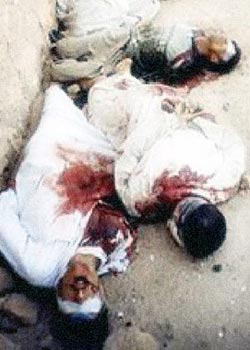LGBT Iraqis face ‘grave threat’ as Islamic State advances

The bodies of gay Iraqis said to have been assassinated because of their sexuality by religious death squads in 2009.
LGBT Iraqis are experiencing high levels of persecution that puts many of them at imminent risk of death, say human rights groups.
According to two publications released by the International Gay and Lesbian Human Rights Commission (IGLHRC), MADRE, an international women’s human rights organisation, and the Organisation of Women’s Freedom in Iraq (OWFI), while the conflict in Iraq has placed hundreds of thousands at risk of serious human rights abuses, LGBT individuals are among the least protected of all groups.
The report When Coming Out is a Death Sentence documents violence and serious human rights abuses against LGBT individuals perpetrated by relatives, tribal factions and by Islamist militias and vigilantes. The research was carried out from July to September, and includes interviews with 25 individuals.
The collapse of the rule-of-law in central Iraq has ignited violence by sectarian militias against individuals seen as transgressing social norms, say the groups. In June, for example, two adolescent boys thought to be gay were killed and beheaded in Baghdad — their heads tossed in the garbage.
The report states that LGBT individuals have little to no protection from family, community or government, which are sometimes complicit in abuses against them.
One consequence of the rapid advance of the Islamic State and its takeover of large swathes of Iraq is the closing of escape routes for LGBT Iraqis to travel to safer parts of the country, such as parts of Iraqi Kurdistan.
Though little concrete information is known about the situation for LGBT people in the areas controlled by the Islamic State, the group’s rise is alarming in this context because it prescribes death for individuals engaged in same-sex activities. Researchers spoke to a Syrian LGBT activist who said he had seen the Islamic State’s announcements of the execution of two men for homosexual acts.
“LGBT Iraqis are in a desperate situation that demands action,” said Jessica Stern, executive director of IGLHRC. “Many Iraqis face violence and serious human rights abuses but LGBT Iraqis, reviled across large segments of society, have none of the protection that can come from families, tribes and the community-at-large. Now, many LGBT Iraqis literally must hide to protect themselves. Exposure can mean death in the chaos of present-day Iraq.”
“Human rights advocates, in Iraq and across the world, are banding together to sound the alarm. Respect for all human rights, indivisible and universal, demands that we stand up for LGBT people who are in grave danger now,” said Yifat Susskind, executive director of MADRE. “This struggle, to defend all who are targeted for their gender and sexuality, is central to securing human rights for all people.”
The second report, We’re Here: Iraqi LGBT People’s Accounts of Violence and Rights Abuses, relates the suffering and harrowing experiences of five LGBT individuals — three gay men, a lesbian woman and a transgender woman — immediately before the current crisis in Iraq set in.
We’re Here highlights the long-standing exclusion, discrimination and violence against LGBT individuals in Iraq and describes the individuals’ daily struggles to survive and overcome violence and abuse.
In one horrific example, a lesbian identified by the pseudonym Leyla described her girlfriend’s killing by her family after their relationship became known. Leyla said she personally was later kidnapped and tortured by a militia, and she witnessed the slaughter of a gay man detained with her. None of the perpetrators of this violence have been brought to justice.
Hossein Alizadeh, Middle East and North Africa regional program coordinator for IGLHRC, said, “The stories of LGBT people in Iraq are a painful reminder of the rampant abuse and violence that these individuals face because of their sexual orientation, gender identity, or gender expression. No human being should suffer inhumane treatment because of who they are.”
As one individual commented in We’re Here, “We are not a threat to our country. We don’t want to undermine the fabric of Iraqi society or violate religious laws. We are simply human beings that deserve to be treated with the respect and dignity owed to all people.”
Leave a Reply